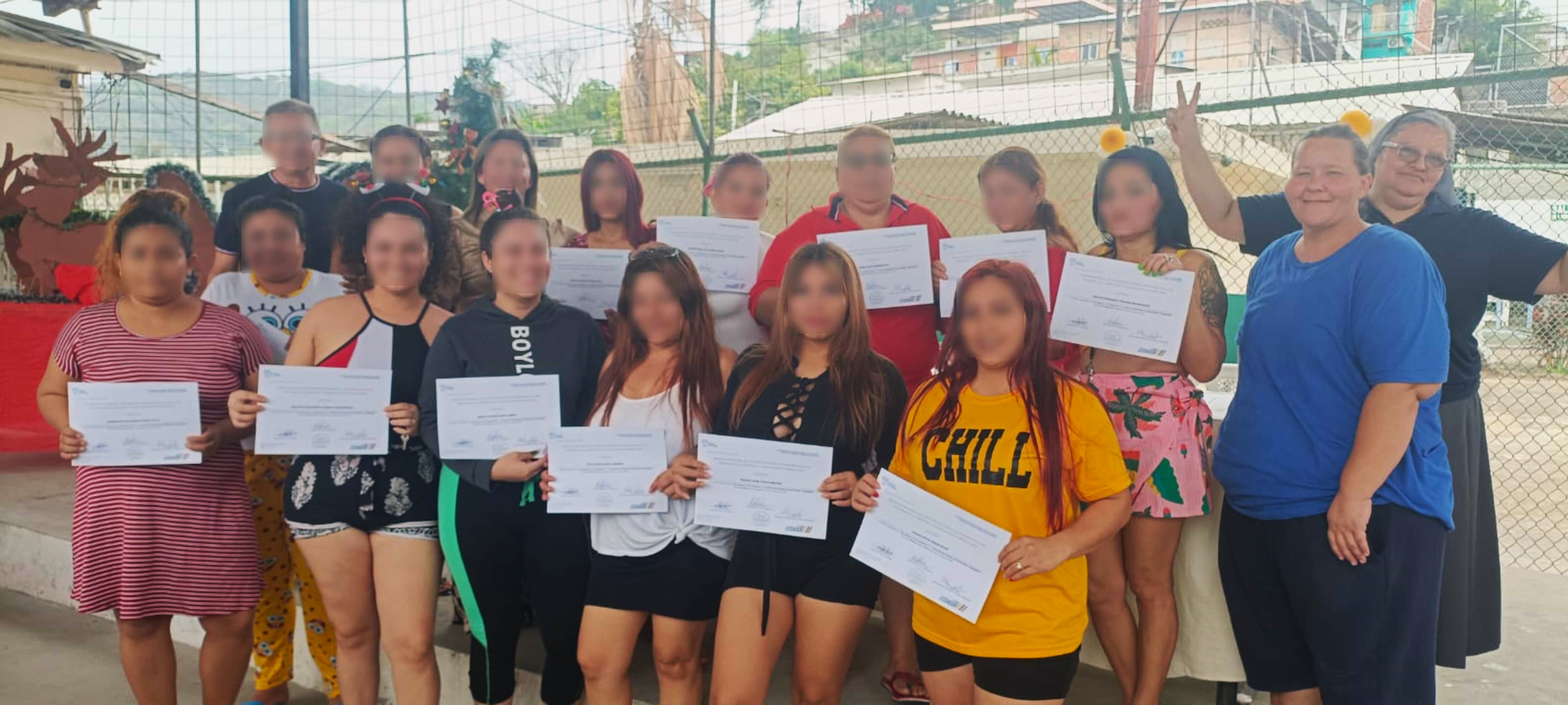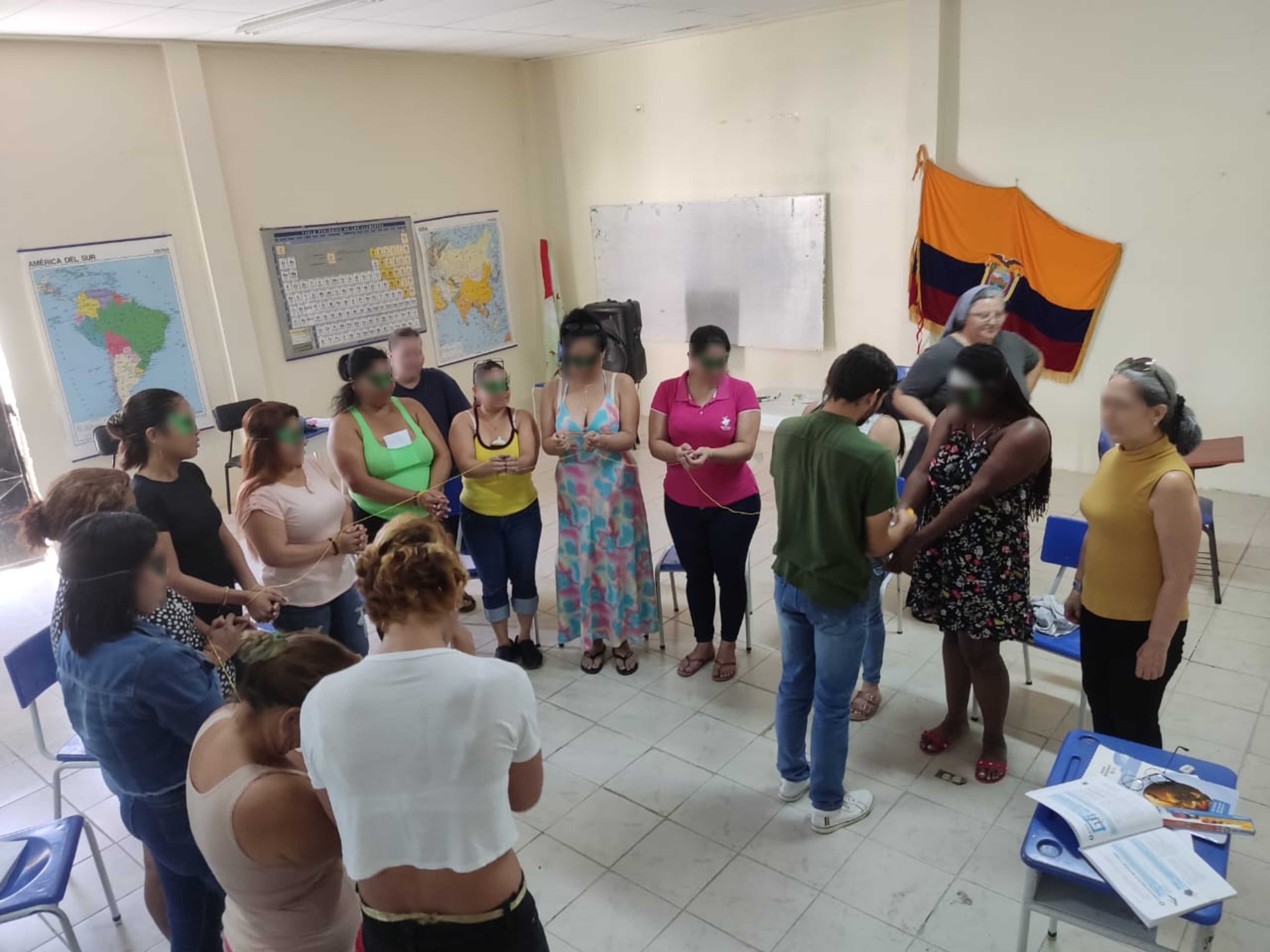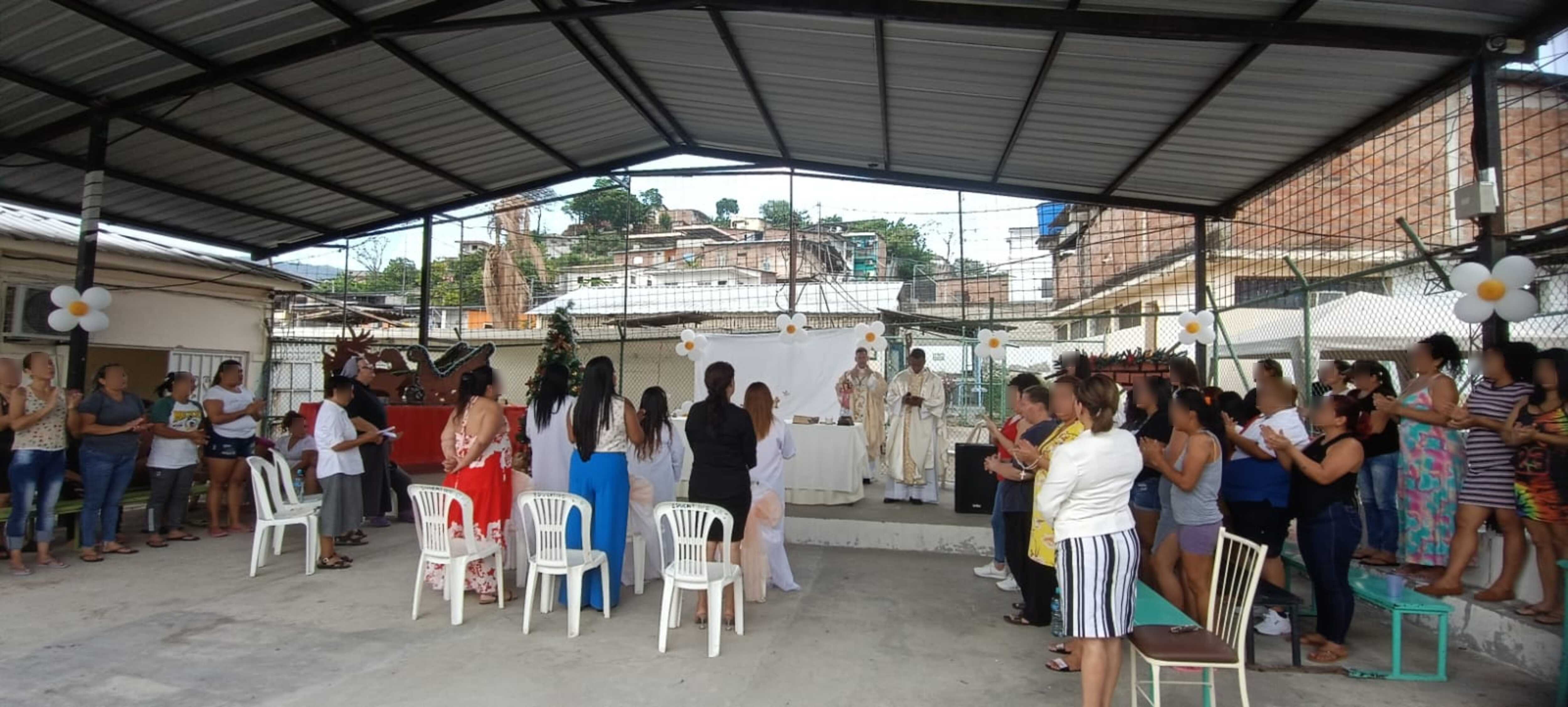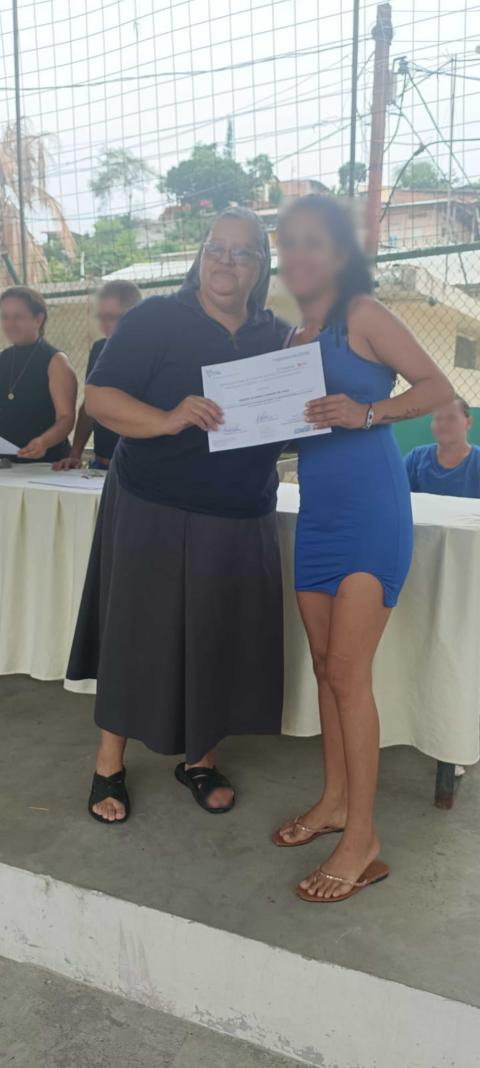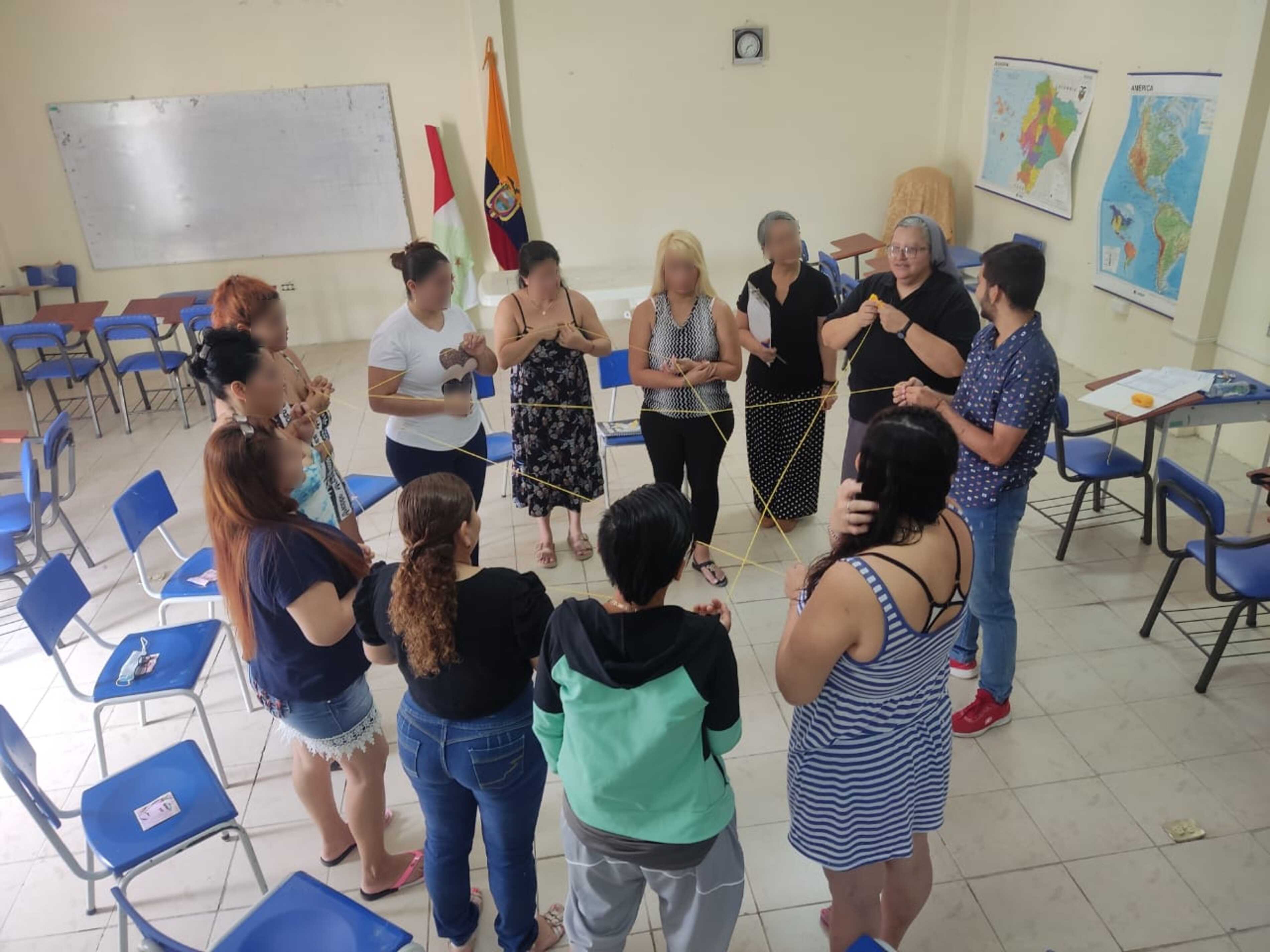
A group of women participate in the School of Reconciliation that Sr. Maritza Rolón Cevallos develops in Regional Center No. 1, a women's prison in Portoviejo, Ecuador. (Courtesy of Maritza Rolón Cevallos)
Ecuador hurts. The so-called center of the world is under the spotlight of the international press because of recent violence from mafias linked to drug trafficking. Some 20 criminal groups have declared war on the state, while Daniel Noboa, president of the republic, announced a state of emergency by decree 111, and then an "internal armed conflict" to stop the escalation of terrorist attacks, prison riots, looting and extortion.
"It is a social metastasis," Sr. Maritza de Jesús Rolón Cevallos of the Comunidad Cristo Misionero Orante told Global Sisters Report. The sister is a pastoral leader of prison ministry in Manabí, a coastal province in the western part of the country, one of the hardest hit by violence and poverty.
In addition to her religious profession, Rolón Cevallos has a bachelor's degree in clinical psychology from the Pontificia Universidad Católica de Quito, and a certificate in the social doctrine of the church.
Since her time as a student and novice she has "consecrated herself" to Christ in prisons, she said, and now, with more than 28 years of religious life, she knows firsthand the cries of those who "are deprived of their freedom, but not of their dignity."
Rolón Cevallos said that her vocation began at a very young age and that her maternal aunt and the religious of the Colegio la Inmaculada of the Sisters of Providence of Quito fostered this call. But it was in the Inca prison, north of the capital, when she experienced mercy and closeness to these outcasts of society, during her internship in clinical psychology.
"In the women's ward, I had to be a mediator between those deprived of freedom; in the event of any altercation, I had to solve problems of coexistence," she said.
'Let us hope that we do not go to extremes, nor that violence is unleashed; nor that a state is established that violates human rights, as is happening in El Salvador.'
—Sr. Maritza Rolón Cevallos on the crisis in Ecuador
Thanks to this experience, the religious has managed to establish a career that led her to be appointed coordinator of prison ministry of the Portoviejo Archdiocese as of January 2024.
"Monsignor Eduardo Castillo Pino has asked me to assume the direction of pastoral ministry for the four prisons in Manabí this year," said Rolón Cevallos, a responsibility that she does along with catechesis in Catholic Charismatic Renewal, in tune with the charism of her congregation: "We go on mission and we pray."
The causes of the current Ecuadorian crisis are varied, but one that has the most impact is "the political instability" of Latin American countries with weak democratic systems, networks of corruption, and politics, Rolón Cevallos argued. "We change presidents in Ecuador like we change shirts; there is no conscious awareness in the election of a politician, nor do politicians have clear proposals; there is a lot of instability that allows these criminal groups to create spaces for themselves," she said.
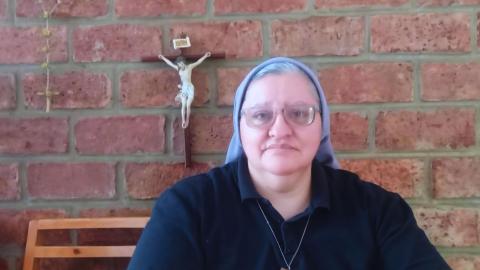
Sr. Maritza Rolón Cevallos belongs to the Cristo Misionero Orante Community, which has two centers in Ecuador: one in Quito and the other in Portoviejo. (Courtesy of Maritza Rolón Cevallos)
GSR: Looking back after 28 years of consecrated life, what has been the most difficult part of this journey?
Rolón Cevallos: The most difficult thing: my personal struggle, my leaps of faith, of absolute abandonment where the Lord has been showing me his "divine will"; for that I am deeply grateful, although nothing is difficult with him.
You have been involved in prison ministry throughout your mission. What have you learned from those deprived of their freedom?
I have learned to see with different eyes, to discover their pain and make it a sign of hope of the imprisoned Jesus. There are very difficult periods when sadness seems to win, but their families, their children and their struggles remind me that I have learned to listen with the eyes of my heart.
They have communicated their faith to me, their love for God. Ultimately, I have learned to love.
And how has your community welcomed this work that you develop in prisons?
We are very clear as a community that we are for the forgotten and most needy, so there is no problem with that. As a matter of fact, I have brought my sisters so they can experience the presence of God and provide catechesis.
'In Ecuador ... there is no conscious awareness in the election of a politician, nor do politicians have clear proposals; there is a lot of instability that allows these criminal groups to create spaces for themselves.'
—Sr. Maritza Rolón Cevallos
What can be done to overcome the problem of stigmatization, especially by those who think that those deprived of freedom are there because they "deserve it"?
These stigmatizing phrases are so painful. We as a church talk about restoring our brothers and sisters to place them at the center, recognizing their rights and dignity. These are painful life stories, and they have to deal with aggression.
The key to it all is restorative justice. I have worked with the Foundation for Reconciliation, which deals a lot with this issue. Restorative justice includes both the victim and the perpetrator, taking them out of those roles and labels of the eternal victim or the eternal victimizer.
I believe that one way to overcome these stigmas is to overcome the vision of punitive justice that promotes violence with more violence. The process is more important than the offense itself in the restoration of relationships. In ecclesial terms, we reject the sin but not the sinner.
Since you began as coordinator of pastoral ministry in the prison of Manabí, how did you assume this responsibility, especially in one of the areas where the internal conflict is strongly felt?
I feel grateful. I hope to be able to serve God through my brothers and sisters deprived of liberty, with much love and with the conviction of their dignity as children of God. I have a very nice team of pastoral ministers, including a priest who accompanies us. We will continue with workshops and accompaniment. I do not doubt it; Christ is there, the imprisoned Christ.
'I have learned to see with different eyes, to discover their pain and make it a sign of hope of the imprisoned Jesus. ... They have communicated their faith to me.'
—Sr. Maritza Rolón Cevallos on her apprenticeship with prisoners in Ecuador
From your point of view as a social psychologist, what do you think is the root of the crisis that Ecuador is experiencing today?
Organized crime is a regional challenge. Unfortunately, in Latin America criminal groups have achieved an area of influence; they have even become professionals in alliance with Colombian and Mexican mafias. It is a very complex situation that leads to other problems such as legalized mining, human trafficking, money laundering, and smuggling. Ecuador has become a cocaine corridor to Europe and the U.S.
In Ecuador, the Ecuador of my soul, our prosecutor gave it a very accurate name, "the metastasis," and that is exactly what it is. These networks penetrate politics, territorial control, and eventually terrorism. Between threats and extortion, we have reached this point.
Let us hope that we do not go to extremes, nor that violence is unleashed; nor that a state is established that violates human rights, as is happening in El Salvador.
How much has the prison crisis affected Ecuador's prison ministry?
It has affected us in Manabí, as well as in Guayaquil, Latacunga, Cuenca and Turin. We have held up processes; this implies a delay of two to three years. It is like taking one step forward and two steps back. With the change of directors in the prison centers, we are denied access; we have to renegotiate so that they get to know us and trust our work.
Advertisement
The entire church in Ecuador is committed to the paths of peace. How distant do you see this longing?
I cannot say for sure how fast or slow this process will be. It will depend on how the authorities and citizens, who have a lot of responsibility in this search for peace, manage it.
Regarding the dialogue between these organizations and the government, this is complicated. Neither party is willing to give in; each one seeks to impose an agenda. So, the situation leads us to a standoff.
Although, I repeat, during these days I have been able to see a very positive response from the citizens who have left fear behind; and the church and the common people continue to bet on getting out of the crisis in which we find ourselves.
What can the church propose to find peace?
The church has proposed to channel dialogues, and to be an arbiter between one group and the other. In fact, some hostages have been released, especially in Esmeraldas, with the intervention of the bishop.
From the point of view of prison ministry, I must say something: We still do not have that strength, even though we have a presence. We require the full support of our bishops. We need to be able to try to hear both sides. We have the advantage that the inmates, administrators and police know us. There, we would be natural mediators.
You affirm that it is not enough to be good, but to aspire to holiness. How can this holiness be found in prisons?
Being children of God, receiving that baptism, we are the temple of this Holy Spirit, and this allows us to believe that God can, because his power is great. I know sisters and brothers deprived of freedom who have reached spiritual maturity. They live their cross, and when you have the opportunity to unveil that fragile part, you can find Jesus Christ imprisoned. I believe that, beyond holiness, it is in transforming them into Jesus.
This Q&A was originally published in Spanish Feb. 1, 2024.


